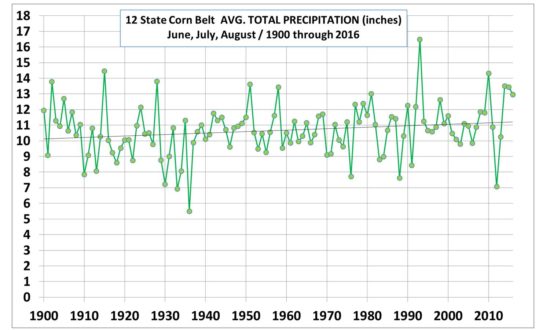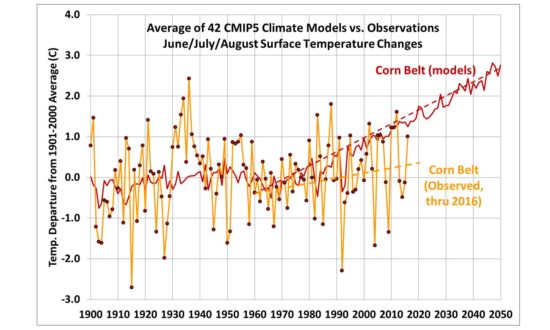For many years we have been warned that climate change is creating a “climate crisis”, with heat and drought reducing agricultural yields to the point that humanity will suffer. Every time there’s a drought, we are told that this is just one more example of human-caused climate change.
But droughts have always occurred. The question is: Are they getting worse? And, has modest warming had any effects on grain yields?
We have yet to experience anything like the Dust Bowl drought of the 1930s, or the mega-droughts the western U.S. tree ring record suggests occurred in centuries past.
And even if they do occur, how do we know they were not caused by the same natural factors that cause those previous droughts? While “global warming” must cause more precipitation overall (because there is more evaporation), whether this means increased drought conditions anywhere is pretty difficult to predict because it would require predicting an average change in weather patterns, which climate models so far have essentially no skill at.
So, here we are with yet another year (2016) experiencing either record or near-record yields in corn, soybeans, and wheat. Even La Nina, which was widely feared would cause reduced crop yields this year, did not materialize.
How can this be?
How has Climate Changed in the U.S. Corn Belt?
Let’s start with precipitation for the main growing months of June-July-August over the 12-state Corn Belt (IL, IN, IA, KS, NE, ND, SD, MO, WI, MN, MI, OH). All data come from official NOAA sources. Since 1900, if anything, there has been a slight long-term increase in growing season precipitation:
In fact, the last three years (2014-16) has seen the highest 3-yr average precip amount in the entire record.
If we examine temperature, there has been some warming in recent decades, but nothing like that predicted for the same region from the CMIP5 climate models:
That plot alone should tell you that something is wrong with the climate models. It’s not even obvious a statistically significant warming has occurred, let alone attribute it to a cause, given all of the adjustments (or lack of proper adjustments) that have been made to the surface thermometer data over the years. Note the models also cannot explain the Dust Bowl warmth of the 1930s, because the models do not mimic the natural changes in Pacific Ocean circulation which are believed to be the cause.
So, has Climate Change Not Influenced Grain Yields?
Let’s assume the temperature and precipitation observations accurately reveal what has really happened. Has climate change since 1960 impacted corn yields in the U.S.?
As part of some consulting I do for a company that monitors grain markets and growing conditions around the world, last year I quantified how year-to-year variations in U.S. corn yields depend on year-to-year changes in precipitation and temperature, over the period 1960 through 2014. I then applied that relationship to the long-term trends in precipitation and temperature.
What I found was that there might be a small long-term decrease in yields due to climate change, but it is far exceeded by technological advancements that increase yields.
In fact, based upon studies of the dependence of corn yield on CO2 fertilization, the negative climate impact is even outweighed by the CO2 fertilization effect alone. (More CO2 is well known to fertilize, as well as increase drought tolerance and make plants more efficient in their water use).
The people I know in the grain trading business do not even factor in climate change…primarily because they do not yet see evidence of it.
It might well be there…but it is so overwhelmed by other positive factors, especially improved varieties, that it cannot be observed in corn yield data. In fact, if varieties can be made more heat tolerant, it might be that there will be no climate change impact on yields.
So, once again, claims of severe agricultural impacts from climate change continue to reside in the realm of science fiction….in the future, if at all.

 Home/Blog
Home/Blog






This blog is too good and informative marmur cena
Great Content, Keep Sharing.